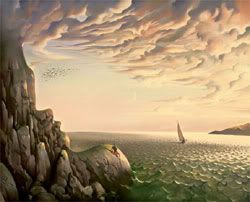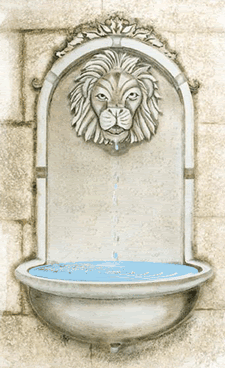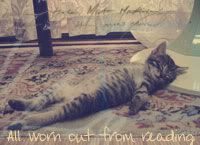A Confession
(Tongue in cheek, Lewis makes fun of his own inability to understand some modern poets' metaphors):
 I am so coarse, the things the poets see
I am so coarse, the things the poets seeAre obstinately invisible to me.
For twenty years I've stared my level best
To see if evening--any evening--would suggest
A patient etherized upon a table*;
In vain. I simply wasn't able.
To me each evening looked far more
Like the departure from a silent, yet a crowded, shore
Of a ship whose freight was everything, leaving behind
Gracefully, finally, without farewells, marooned mankind.
Red dawn behind a hedgerow in the east
Never, for me, resembled in the least
A chilblain on a cocktail-shaker's nose;
Waterfalls don't remind me of torn underclothes,
Nor glaciers of tin-cans. I've never known
The moon look like a hump-backed crone--
Rather, a prodigy, even now
Not naturalized, a riddle glaring from the Cyclops' brow
Of the cold world, reminding me on what a place
I crawl and cling, a planet with no bulwarks, out in space.
Never the white sun of the wintriest day
Struck me as un crachat d'estaminet**.
I'm like that odd man Wordsworth knew, to whom
A primrose was a yellow primrose, one whose doom
Keeps him forever in the list of dunces,
Compelled to live on stock responses,
Making the poor best that I can
Of dull things...peaocks, honey, the Great Wall, Aldebaran,
Silver weirs, new-cut grass, wave on the beach, hard gem,
The shapes of horse and woman, Athens, Troy, Jerusalem.
~C.S. Lewis, Poems, "A Confession", (1st published in Punch, Dec 1, 1954)
___________________________
*this is a reference to T.S. Eliot's poem "Prufrock"
** a reference to a poem by Jules Laforgue, one of the first French poets to write in free verse: "The Winter Comes", where the winter sun is referred to as looking like "spittle in a pub's spittoon".
Modern art link of the day: Vladimir Kush, whose work "Bound for Distant Shores" is shown above.




4 Comment(s):
I took a college english course last fall titled, British Literature after 1800.We studied mostly the poets and I find myself entirely agreeing with Lewis here. It was a hard course for me to begin with. Interpreting is not my best quality (though I do try, terribly). I did sort of get the hang of it by the end of the semester.?. Still I must agree and am glad not to be the only one. Disappointed yet not entirely surprised, there was not one mention of C. S. Lewis. We began with the Romantics, went on to the Victorians, and ended with The Twentieth Century. Yet, no Lewis. I was most disappointed:( One of the greats (if not the great) of British Lit. HuH? Wonder if Christianity had anything to do with it?
Hi Anonymous! I can understand why Lewis's poetry wasn't mentioned--I don't think he's ever achieved any level of critical acclaim for his poetic endeavors. Most reviewers seem to give him lukewarm marks on his poetry (I beg to differ, but that's just me). I suppose they mentioned Tolkien--who else did they recognize?
No sorry, no Tolkien either. We had William Yeats, a little Ted Hughes, some Auden and Thomas, and then a few short stories from D. H. Lawrence, Woolf, and Joyce. Oh, we did have one poem from T.S. Elliot which we reviewed rather quickly. I was not familiar with him, but didn't he have something to do with the Inklings. Or perhaps he knew them? I am new fairly new to British Lit.
I am new fairly new to British Lit.
Me too. :)
Post a Comment
<< Home